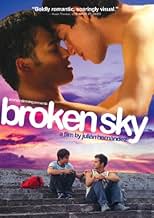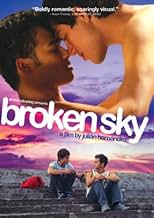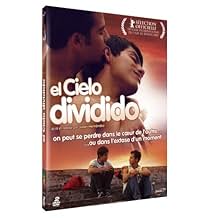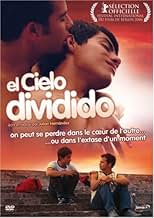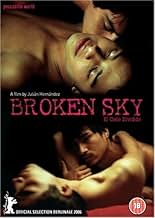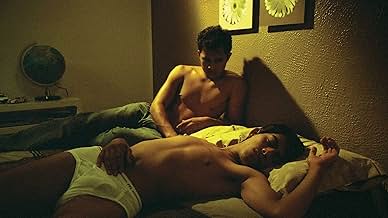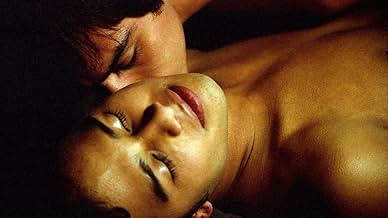VALUTAZIONE IMDb
5,7/10
1255
LA TUA VALUTAZIONE
Aggiungi una trama nella tua linguaTwo students, Gerardo and Jonas, are in love. However, Jonas becomes obsessed with another boy, which leads to Gerardo moving into arms of Sergio.Two students, Gerardo and Jonas, are in love. However, Jonas becomes obsessed with another boy, which leads to Gerardo moving into arms of Sergio.Two students, Gerardo and Jonas, are in love. However, Jonas becomes obsessed with another boy, which leads to Gerardo moving into arms of Sergio.
- Regia
- Sceneggiatura
- Star
- Premi
- 2 vittorie totali
Clarisa Rendón
- María
- (as Clarissa Rendón)
Recensioni in evidenza
"Broken Sky" is an art film with great performances, visually entertaining (stills/photography shots during credits are superbly done!), and plot treatment not usually seen in any gay films. Some people may find scenes excruciatingly long, but I've enjoyed every moment of it and the journey the director wants to convey in this movie. You must know that you need this arduous shots to feel the emotions of the characters in the movie. The sex scenes are tastefully done, not vulgar, and the gratuitous frontal nudity is significant (in one scene, main actor examines his body/self on the mirror). I've always admired Latin cinema movie-making as mostly they always get the right texture and lighting for their 35 mm. movie. In totality, it's one of the best films I've seen during L.A. OUTFEST 2006 (next to movies: "A Love to Hide," "Boy Culture" and "The Blossoming of Maximo Oliveros"). -- Oliver Carnay
'El Cielo dividido' (BROKEN SKY) is a daring, experimental film from Mexican writer/director Julián Hernández and as such it is bound to polarize audiences. Some will fault the film for self-indulgence while others will praise the bravery of a film of this topic to come from a country not exactly known for its flexible social attitudes.
Julián Hernández focuses on the history of a first love and without using dialogue he tells his story simply with silent actors, minimal narrative comments which serve as program notes, music, and ravishingly beautiful photographic composition. Gerardo (Miguel Ángel Hoppe) opens the film, a solo youth wandering what appears to be the streets of Mexico City finally ending up in an open amphitheater where his eye glimpses another lone youth Jonas (Fernando Arroyo) sitting staring into space. Gerardo wanders over to him, sits beside him, gains the courage to touch his shoulder, Jonas responds glowingly - and love begins. Through the next scenes we find the couple making love both in bed and in unexpected public places including the stacks of the library of the school where they both are students -and where another pair of eyes enters: Sergio (Alejandro Rojo) watches longingly as Gerardo and Jonas kiss and display an aura of passion Sergio obviously longs for.
The new couple share many experiences, all bathed in love, until they eventually go to a disco: Jonas dances with an enchanted Bruno (Ignacio Pereda) and a trace of chemistry is generated, a fact that Gerardo, watching the boys dance, senses and is disturbed. A crack is created in their bliss and that crack only widens as they each have mixed responses to what they perceive is escaping. Gerardo encounters the winsome Sergio and the two bond physically, a fact that forces Jason to reevaluate his initial feelings for Gerardo.
All of this story is told without dialogue of words but with a very strong dialogue of eyes. Director Hernández seems to want to share how love is an internalized emotion, only demonstrated with physical intimacy, but fragile as a newborn in its vulnerability to wounds. Cinematographer Alejandro Cantú finds stunning settings and lighting and sensitive explorations of love making that never exceed tasteful states. His manner of showing time elapsing is to pan walls within a room that serve as flashbacks and flash-forwards as a means of carrying the story forward. Film editor Emiliano Arenales Osorio uses some very creative techniques to keep the viewer guessing as to whether we are observing fact, fantasy, present or past. And the musical score by Arturo Villela deftly maintains the minimalist stance with simple phrases by cello, harpsichord, and violin, saving the passion expression for the use of Dvorák in Rusalka's 'Song to the Moon' as ravishingly sung by Renée Fleming All of those praises being said, the major reason this film doesn't retain an audience base is its length: it is 140 minutes long, repetitive, and would have been much more powerful had it been cut to 90 minutes at best. It is far too visually stunning a piece of work to step beyond the patience of an audience happy to see the birth and blossoming and challenges of a first love between two beautiful young men. The actors are indeed a pleasure to watch, but in this case less is more. One wonders what Julián Hernández will create next. He deserves applause for this experimental film but hopefully will learn from its tendency toward self-indulgence. Grady Harp
Julián Hernández focuses on the history of a first love and without using dialogue he tells his story simply with silent actors, minimal narrative comments which serve as program notes, music, and ravishingly beautiful photographic composition. Gerardo (Miguel Ángel Hoppe) opens the film, a solo youth wandering what appears to be the streets of Mexico City finally ending up in an open amphitheater where his eye glimpses another lone youth Jonas (Fernando Arroyo) sitting staring into space. Gerardo wanders over to him, sits beside him, gains the courage to touch his shoulder, Jonas responds glowingly - and love begins. Through the next scenes we find the couple making love both in bed and in unexpected public places including the stacks of the library of the school where they both are students -and where another pair of eyes enters: Sergio (Alejandro Rojo) watches longingly as Gerardo and Jonas kiss and display an aura of passion Sergio obviously longs for.
The new couple share many experiences, all bathed in love, until they eventually go to a disco: Jonas dances with an enchanted Bruno (Ignacio Pereda) and a trace of chemistry is generated, a fact that Gerardo, watching the boys dance, senses and is disturbed. A crack is created in their bliss and that crack only widens as they each have mixed responses to what they perceive is escaping. Gerardo encounters the winsome Sergio and the two bond physically, a fact that forces Jason to reevaluate his initial feelings for Gerardo.
All of this story is told without dialogue of words but with a very strong dialogue of eyes. Director Hernández seems to want to share how love is an internalized emotion, only demonstrated with physical intimacy, but fragile as a newborn in its vulnerability to wounds. Cinematographer Alejandro Cantú finds stunning settings and lighting and sensitive explorations of love making that never exceed tasteful states. His manner of showing time elapsing is to pan walls within a room that serve as flashbacks and flash-forwards as a means of carrying the story forward. Film editor Emiliano Arenales Osorio uses some very creative techniques to keep the viewer guessing as to whether we are observing fact, fantasy, present or past. And the musical score by Arturo Villela deftly maintains the minimalist stance with simple phrases by cello, harpsichord, and violin, saving the passion expression for the use of Dvorák in Rusalka's 'Song to the Moon' as ravishingly sung by Renée Fleming All of those praises being said, the major reason this film doesn't retain an audience base is its length: it is 140 minutes long, repetitive, and would have been much more powerful had it been cut to 90 minutes at best. It is far too visually stunning a piece of work to step beyond the patience of an audience happy to see the birth and blossoming and challenges of a first love between two beautiful young men. The actors are indeed a pleasure to watch, but in this case less is more. One wonders what Julián Hernández will create next. He deserves applause for this experimental film but hopefully will learn from its tendency toward self-indulgence. Grady Harp
The unique film "Broken Sky" is an invitation to a different world, a quiet and dreamlike place where only love seems to hold any importance. The characters Gerardo and Jonas inhabit this private world, and no one else matters. Filmed in beautiful gold and brown shades, the two Mexican boys fall in love at first sight. The two are so in sync with each other that they barely need words to communicate their feelings. It seems things could not be more ideal for these two guys, until outside influences and doubt threaten to destroy their perfect, untainted love. "El Cielo Dividido" is not really a mainstream film; there is virtually no dialog, and the production moves along like a slow, hypnotic dance, rather than the typical fast pace of todays cinema. There has rarely been a film that so effectively creates it's own world, and it is a world filled with beauty and romance and sadness, a world that i personally was reluctant to leave at the film's end. Actors Miguel Angel Hoppe and Fernando Arroyo are both beautiful and utterly believable as the confused lovers, overwhelmed by intense feelings that are so new to them. Unique especially for "gay cinema" is this film's subtlety. The nudity and sexuality is not aggressively splashed across the screen to shock or titillate the viewer. It is simply there, and it is all a part of this private world of the two lovers. Best of all, "Broken sky" manages to recreate the feelings of first time love and sexual awakening like few films have managed. This is far from the typically flashy and garishly silly style of most gay films. Thankfully, there are no gay stereotypes to be found here; this is a film about love, and nothing more. "Broken Sky" is a unique and beautiful film.
10mansart
I guess it's not surprising that this film received mixed reviews. I knew when I saw it that it would not be for everyone. I have to say though that I really loved this film and would gladly see it again, particularly to share it with someone I care for.
I think you have to just sit back, relax and let this film wash over you. The best way for me to describe it is as a beautiful poem about love, particularly young love. It conveys all the thrill and excitement, the confusion and pain, the jealousy and longing...really all the emotions one experiences from first love. Rather than words, however, this poem is composed of pictures and music and ambient sound. Like a poem it isn't always straightforward, you don't always understand every moment, but the feelings that it evokes are strong and genuine, and it captures universals in a way that a more specific, narrative film never could.
The director has said that the reason there is so little dialogue is that the moments he chose to capture were the ones between the dialogue; before the characters felt the need to speak, and after they had said all there was to say. What's amazing is how illuminating those moments are when one chooses to pay attention to them.
In the context of this film I'm not sure what the phrase "gratuitous male nudity" means. Although I know it never happens in the U.S., in other countries people get naked. It's part of life. It's certainly part of the relationship that this film is all about, and to show it, unceremoniously, as part of the fabric of a life and a relationship can hardly be described as "gratuitous".
I guess the best compliment I can pay this film is to say that I am still thinking and talking about it, weeks after seeing it. The camera work, the composition, the use of sound and music, and the contribution of the young stars, all contribute to the film's success. If you enjoy film-making as an art form, I'd highly recommend you seek out this film.
I think you have to just sit back, relax and let this film wash over you. The best way for me to describe it is as a beautiful poem about love, particularly young love. It conveys all the thrill and excitement, the confusion and pain, the jealousy and longing...really all the emotions one experiences from first love. Rather than words, however, this poem is composed of pictures and music and ambient sound. Like a poem it isn't always straightforward, you don't always understand every moment, but the feelings that it evokes are strong and genuine, and it captures universals in a way that a more specific, narrative film never could.
The director has said that the reason there is so little dialogue is that the moments he chose to capture were the ones between the dialogue; before the characters felt the need to speak, and after they had said all there was to say. What's amazing is how illuminating those moments are when one chooses to pay attention to them.
In the context of this film I'm not sure what the phrase "gratuitous male nudity" means. Although I know it never happens in the U.S., in other countries people get naked. It's part of life. It's certainly part of the relationship that this film is all about, and to show it, unceremoniously, as part of the fabric of a life and a relationship can hardly be described as "gratuitous".
I guess the best compliment I can pay this film is to say that I am still thinking and talking about it, weeks after seeing it. The camera work, the composition, the use of sound and music, and the contribution of the young stars, all contribute to the film's success. If you enjoy film-making as an art form, I'd highly recommend you seek out this film.
Saw it at SIFF. This is a different kind of film -- but I loved it. I loved the fact that there wasn't a lot of dialogue. I appreciated the non-verbal aspects of this film. While the lack of dialogue some may find tedious it was nice to see something that wasn't shot for the small screen, something that made me pay attention visually, and something that made me think a bit. I thought the camera technique used to convey the passage of time was quite effective. The only technical aspect which drove me nuts was the use of white subtitles on a white background; fortunately this was a small, small part of the film but at key junctions in the story development. I'm rather fond of this film and would like to watch it again.
Lo sapevi?
- ConnessioniReferenced in I Griffin: Road to Rupert (2007)
- Colonne sonoreEn mi cielo
Written and performed by Volovan
By Arrangement with Universal Music Mexico
I più visti
Accedi per valutare e creare un elenco di titoli salvati per ottenere consigli personalizzati
Dettagli
- Data di uscita
- Paese di origine
- Siti ufficiali
- Lingua
- Celebre anche come
- Broken Sky
- Luoghi delle riprese
- Aziende produttrici
- Vedi altri crediti dell’azienda su IMDbPro
Botteghino
- Lordo Stati Uniti e Canada
- 29.185 USD
- Fine settimana di apertura Stati Uniti e Canada
- 4956 USD
- 1 ott 2006
- Lordo in tutto il mondo
- 160.445 USD
- Tempo di esecuzione2 ore 20 minuti
- Colore
- Mix di suoni
- Proporzioni
- 1.85 : 1
Contribuisci a questa pagina
Suggerisci una modifica o aggiungi i contenuti mancanti

Divario superiore
By what name was El cielo dividido (2006) officially released in Canada in English?
Rispondi
